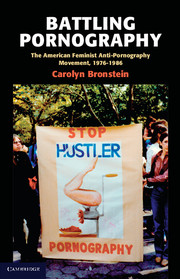Book contents
- Frontmatter
- Contents
- List of Figures
- Acknowledgments
- Introduction: Battling Pornography
- 1 Seeds of Discontent
- 2 Male Violence and the Critique of Heterosexuality
- 3 Have You Seen Deep Throat Yet?
- 4 “I'm Black and Blue from the Rolling Stones and I Love It!”
- 5 Something Inside Me Just Went “Click”
- 6 Growing Pains
- 7 Porn Tours
- 8 The New Lay of the Land
- 9 Anti-Pornography Comes Undone
- Conclusion: Porn Is Here to Stay
- Bibliography
- Index
- References
Conclusion: Porn Is Here to Stay
The Feminist Anti-Pornography Movement in the 1980s and Beyond
Published online by Cambridge University Press: 05 June 2012
- Frontmatter
- Contents
- List of Figures
- Acknowledgments
- Introduction: Battling Pornography
- 1 Seeds of Discontent
- 2 Male Violence and the Critique of Heterosexuality
- 3 Have You Seen Deep Throat Yet?
- 4 “I'm Black and Blue from the Rolling Stones and I Love It!”
- 5 Something Inside Me Just Went “Click”
- 6 Growing Pains
- 7 Porn Tours
- 8 The New Lay of the Land
- 9 Anti-Pornography Comes Undone
- Conclusion: Porn Is Here to Stay
- Bibliography
- Index
- References
Summary
Gloria Leonard had a big idea. It was 1982, and the federal government had ordered AT&T to sell off its regional “Baby Bell” telephone companies and to give up its monopoly on 900 numbers in the wake of a landmark antitrust court case. People typically called the 900 numbers to find out the time or the weather. Some local phone companies even offered “Dial-a-Joke.” But now the 900 lines were up for grabs, and outside information providers would get a chance to determine their content and keep a share of the profits. Leonard, a former nightclub manager and X-rated movie star who became the publisher of the adult magazine High Society, hoped to secure one. She didn't know if many people called in for the time or the weather. But she had a hunch that lots of people would call in for sex.
New York Telephone used a lottery system to award the leases for its 900 lines, and High Society was one of 21 lucky winners. Leonard set about creating the first erotic telephone service featuring sexually suggestive messages that were supposedly recorded by the magazine's glamorous models. The women described titillating scenarios and sexual encounters, complete with moaning and groaning. The messages changed three times a day. Leonard promoted the new service in the magazine, and waited to see if anyone would call.
- Type
- Chapter
- Information
- Battling PornographyThe American Feminist Anti-Pornography Movement, 1976–1986, pp. 309 - 336Publisher: Cambridge University PressPrint publication year: 2011



